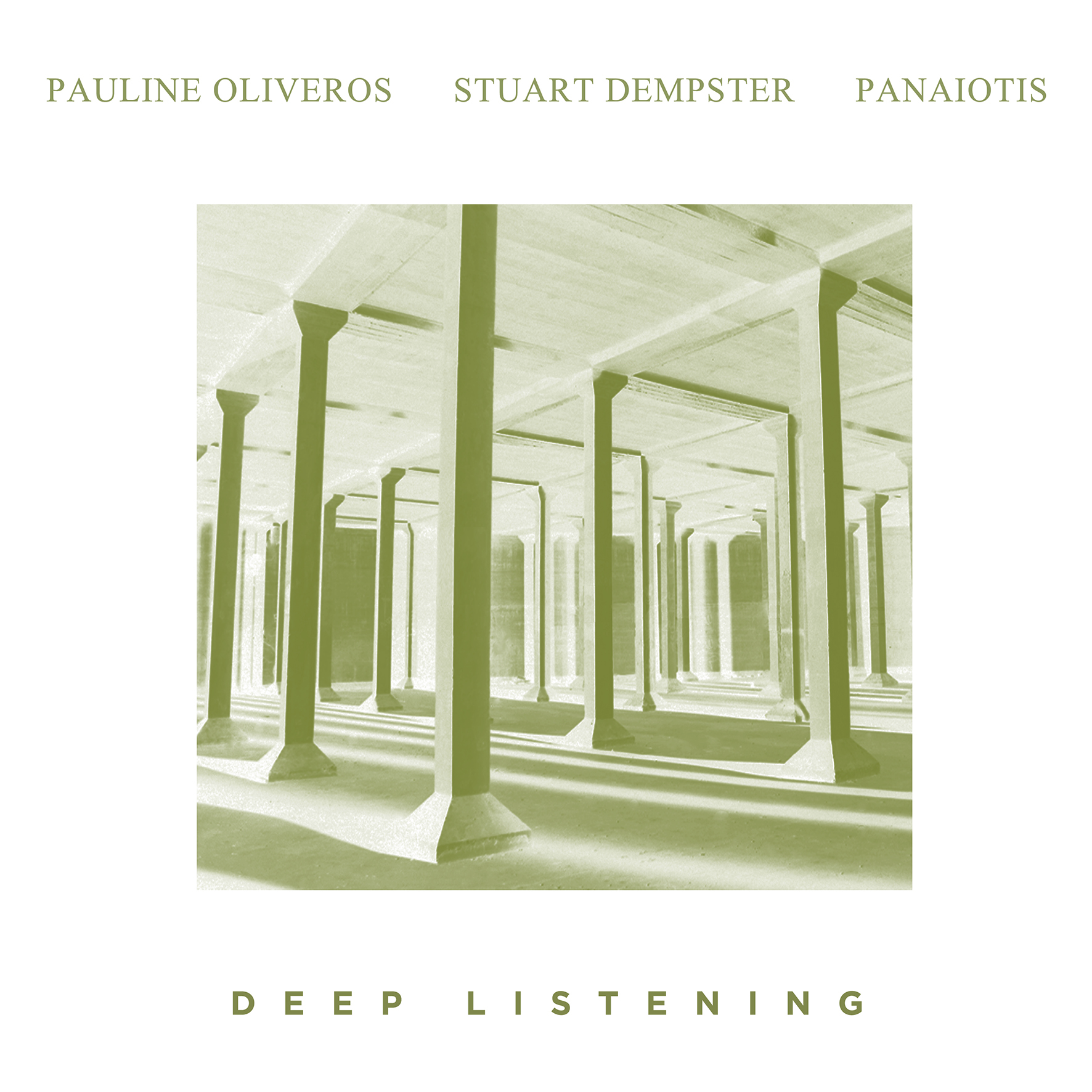Pauline Oliveros-Stuart Dempster-Panaiotis, "Deep Listening"
 Originally released back in 1989 on the New Albion label, this landmark celebration of extreme natural reverb has finally received a long-deserved reissue in honor of its thirtieth anniversary. Obviously, production technology has evolved quite a lot since the '80s and site-specific performances have since become a somewhat common occurrence in the experimental music world, so Deep Listening does not feel quite as radical now as it did when it was first released. Nevertheless, it is still quite a strange and magical album, as I cannot think of any other accordionists who have descended into a two million gallon cistern to explore the incredible acoustic possibilities inherent in a 45-second reverb decay. As someone without a deep technical understanding of how reverb works, I found the new liner notes from recording engineer Al Swanson and Peter Ward quite helpful in explaining exactly why these recordings feel so unreal, but such knowledge is not necessary to appreciate this album: I have been able to enjoy the epic and eerie slow-motion beauty of Deep Listening for years without knowing a single goddamn thing about phase integrity or slap-back. While I cannot say I was exactly clamoring to see this album released in the vinyl format, I am absolutely delighted to see it resurrected and back in the public consciousness.
Originally released back in 1989 on the New Albion label, this landmark celebration of extreme natural reverb has finally received a long-deserved reissue in honor of its thirtieth anniversary. Obviously, production technology has evolved quite a lot since the '80s and site-specific performances have since become a somewhat common occurrence in the experimental music world, so Deep Listening does not feel quite as radical now as it did when it was first released. Nevertheless, it is still quite a strange and magical album, as I cannot think of any other accordionists who have descended into a two million gallon cistern to explore the incredible acoustic possibilities inherent in a 45-second reverb decay. As someone without a deep technical understanding of how reverb works, I found the new liner notes from recording engineer Al Swanson and Peter Ward quite helpful in explaining exactly why these recordings feel so unreal, but such knowledge is not necessary to appreciate this album: I have been able to enjoy the epic and eerie slow-motion beauty of Deep Listening for years without knowing a single goddamn thing about phase integrity or slap-back. While I cannot say I was exactly clamoring to see this album released in the vinyl format, I am absolutely delighted to see it resurrected and back in the public consciousness.
For some reason, my mind has proven extremely resistant to viewing Deep Listening as anything other than a Pauline Oliveros album.Obviously, she is the most famous and influential member of this trio, as well as the artist most closely associated with "deep listening" as a kind of philosophy, but it would be more accurate to view this album as both the birth of Deep Listening Band and the beginning of a long, fruitful creative partnership with composer Stuart Dempster.In fact, it is Dempster's trombone and didgeridoo playing that most prominently sets the tone for the album's two most memorable pieces: the bookends "Lear" and "Nike."To some degree, that suggests "shallow listening" on my part, as Oliveros's subtly shifting bed of lingering accordion tones is crucial in shaping the subtly hallucinatory and harmonically rich backdrop in "Lear."Nevertheless, it is the deep, roiling drone of the didgeridoo that gives the piece its heft and it is the slow, majestic trombone melody that evokes its distinctively timeless and somber feel.That melancholy and vaguely medieval-sounding aesthetic is apt, as "Lear" was incorporated into Lee Breuer's production of King Lear (though I do not know if it was originally composed with that in mind)."Nike," on the other hand, is a bit more abstract and inventive, as it gradually takes shape from a ghostly miasma of voices, clattering metal pipes, and breathy conch shell drones.Admittedly, it takes a little while to fully come together, but it is a quite a bizarre and compelling piece nonetheless, resembling an angelic choir in a desolate factory that gradually curdles into an infernal-sounding crescendo that calls to mind an ancient battlefield littered with corpses (or at least a banshee caught in a thunderstorm).  
Between those two poles, there are a pair of more subtle and nuanced pieces: "Suiren" and "Ione."For the most part, "Ione" is kind of a beatific and meditative inversion of the palette employed for "Lear," as the didgeridoo and accordion converge into a languorously undulating bed of shifting harmonies.More importantly, Dempster's trombone melodies are not at all portentous and blood-soaked, instead lazily unfurling like smoke in something approximating a major key.It is not a bad piece by any means, but "Suiren" is considerably more compelling and is arguably the one piece that most fully captures the transformative alchemy of the cistern's unique acoustics. Aside from an unconventionally employed garden hose, Oliveros, Dempster, and Peter Ward completely abandoned their formidable arsenal of instruments, seashells, and metal pipes to see what they could achieve solely with the sound of their voices.As it turns out, they could achieve quite a lot, as "Suiren" unfolds as a phantasmagoric fog that lies somewhere between Gregorian chant and time-stretched Tuvan throat-singing.It is quite a hauntingly lovely piece and also a comparatively quiet one, which makes it the arguably the one that benefits the most from deep listening (there are no dramatic motifs to steal the focus away from its nuances).It is also very effective illustration of one of Ward's observations about the acoustic character of the space: aside from the long decay, the smooth and pure nature of the cistern's reverb "makes it impossible to tell where the performer stops and the reverberation takes over."
Another illustrative piece is "Balloon Payment," one of the three bonus tracks that Important has added for their reissue: it is nothing more than the sound of a balloon being popped, leaving roughly 45 seconds of rumbling reverberation in its wake.It is admittedly kind of a throwaway piece that only needs to be heard once, but the other two newly added songs ("Phantom" and "Geocentric") are an inspired curatorial inclusion, as they broaden the album's mood palette and end Deep Listening on a considerably brighter note than the war-like intensity of "Nike."Notably, all three new pieces were taken from Deep Listening Band's The Ready Made Boomerang (1991), which was recorded in the same cistern with a somewhat expanded ensemble.I suspect that means Important has no plans to reissue that album and that decision makes sense: the primary appeal of Deep Listening is that it was a cool idea and a fascinating process: trying to unravel the blurry relationships between sounds and their lingering afterimages makes for a very absorbing listen.It was a great experiment and statement of intent, but Dempster and Oliveros did not need to repeatedly collaborate with that same cistern once they learned its acoustic secrets.Moreover, these pieces are far from the best that Dempster and Oliveros have recorded together, as Important's previous Deep Listening Band reissues capture the pair in significantly more sophisticated and refined form.As such, Deep Listening is unquestionably a significant and influential album, but it should be appreciated as the initial creative breakthrough that led to even better things rather than something akin to a stand-alone crown jewel in Oliveros's discography.
Samples:
 



